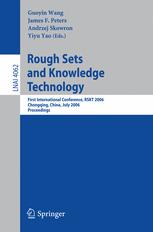

Most ebook files are in PDF format, so you can easily read them using various software such as Foxit Reader or directly on the Google Chrome browser.
Some ebook files are released by publishers in other formats such as .awz, .mobi, .epub, .fb2, etc. You may need to install specific software to read these formats on mobile/PC, such as Calibre.
Please read the tutorial at this link: https://ebookbell.com/faq
We offer FREE conversion to the popular formats you request; however, this may take some time. Therefore, right after payment, please email us, and we will try to provide the service as quickly as possible.
For some exceptional file formats or broken links (if any), please refrain from opening any disputes. Instead, email us first, and we will try to assist within a maximum of 6 hours.
EbookBell Team

5.0
60 reviewsThis volume contains the papers selected for presentation at the First Int- national Conference on Rough Sets and Knowledge Technology (RSKT 2006) organized in Chongqing, P. R. China, July 24-26, 2003. There were 503 s- missions for RSKT 2006 except for 1 commemorative paper, 4 keynote papers and 10 plenary papers. Except for the 15 commemorative and invited papers, 101 papers were accepted by RSKT 2006 and are included in this volume. The acceptance rate was only 20%. These papers were divided into 43 regular oral presentation papers (each allotted 8 pages), and 58 short oral presentation - pers (each allotted 6 pages) on the basis of reviewer evaluation. Each paper was reviewed by two to four referees. Since the introduction of rough sets in 1981 by Zdzis law Pawlak, many great advances in both the theory and applications have been introduced. Rough set theory is closely related to knowledge technology in a variety of forms such as knowledge discovery, approximate reasoning, intelligent and multiagent systems design, and knowledge intensive computations that signal the emergence of a knowledge technology age. The essence of growth in cutting-edge, state-of-t- art and promising knowledge technologies is closely related to learning, pattern recognition,machine intelligence and automation of acquisition, transformation, communication, exploration and exploitation of knowledge. A principal thrust of such technologies is the utilization of methodologies that facilitate knowledge processing.